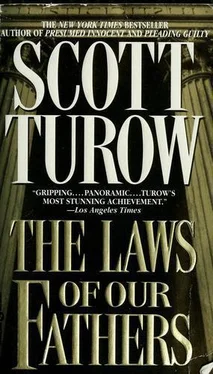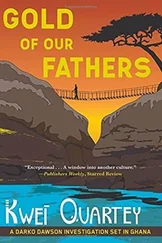Scott Turow - The Laws of our Fathers
Здесь есть возможность читать онлайн «Scott Turow - The Laws of our Fathers» весь текст электронной книги совершенно бесплатно (целиком полную версию без сокращений). В некоторых случаях можно слушать аудио, скачать через торрент в формате fb2 и присутствует краткое содержание. Жанр: Криминальный детектив, на английском языке. Описание произведения, (предисловие) а так же отзывы посетителей доступны на портале библиотеки ЛибКат.
- Название:The Laws of our Fathers
- Автор:
- Жанр:
- Год:неизвестен
- ISBN:нет данных
- Рейтинг книги:5 / 5. Голосов: 1
-
Избранное:Добавить в избранное
- Отзывы:
-
Ваша оценка:
- 100
- 1
- 2
- 3
- 4
- 5
The Laws of our Fathers: краткое содержание, описание и аннотация
Предлагаем к чтению аннотацию, описание, краткое содержание или предисловие (зависит от того, что написал сам автор книги «The Laws of our Fathers»). Если вы не нашли необходимую информацию о книге — напишите в комментариях, мы постараемся отыскать её.
The Laws of our Fathers — читать онлайн бесплатно полную книгу (весь текст) целиком
Ниже представлен текст книги, разбитый по страницам. Система сохранения места последней прочитанной страницы, позволяет с удобством читать онлайн бесплатно книгу «The Laws of our Fathers», без необходимости каждый раз заново искать на чём Вы остановились. Поставьте закладку, и сможете в любой момент перейти на страницу, на которой закончили чтение.
Интервал:
Закладка:
According to the rumors about him always circulating on campus, Eddgar was careful never to issue any revolutionary directives on his own. Even the most treacherous orders – to kill the snitch in Oakland or to aid the Soledad breakout – supposedly had been delivered to One Hundred Flowers through the mouth of June.
Coming and going with Nile or visiting with June to discuss his care, I now and then caught glimpses of the One Hundred Flowers meetings. The revolutionaries engaged in fierce doctrinal disputes, addressing each other as 'Comrade' and invoking the names of Gramsci, Fanon, Sorel, Rosa Luxemburg, and Bakunin, arguing about Lin Piao and China's role in Biafra. Meanwhile, June would slip off with different members to ride around the blocks in someone's car, where communications could take place securely. Before these ride-arounds, June and the passenger would search one another for recording devices, passing their hands across each other's bodies so casually that conversations were not interrupted.
The only time Eddgar's security concerns yielded was with regard to Nile's baby-sitting arrangements. June-called Nile a 'troubled sleeper' and insisted he be put down each evening in his own bed. I could tell the Eddgars had quarreled about this, but June apparently felt I was trustworthy and I stayed in their apartment, alone with Nile, on the nights the Eddgars were out with their 'cells,' or affinity groups. Eddgar kept a deliberate distance from me, to be sure, I guess, that I didn't learn too much.
In truth, Eddgar didn't have casual dealings with many people in Damon. He gave his lectures and spoke at public rallies; he carried on passionately at the faculty senate, delivering speeches which appeared to have been borrowed in tone and, worse, in length from Fidel Castro. Otherwise, he was remote. It was something of a privilege if he made any gesture of recognition when I saw him around the theology department. I was going there regularly in the mornings for meetings of the Damon chapter of the Student Mobilization Committee to End the War, which was coordinating local planning for various nationwide demonstrations that took place that fall.
Early in November, I was there mimeographing observations on draft resistance when the machine broke. I sputtered and wrestled with a reluctant gasket, until someone edged in behind me and extended a hand. When I looked back, I found Eddgar. On good behavior at the department, he wore a plaid shirt and contrasting knit tie, and looked almost raffish. Under one arm, he carried papers for the class he was about to meet. He accepted my gratitude without comment, but took an instant to look over the mimeo, still slopped across the machine's canister in a reeking puddle of toner. He could not have made out much reading backwards, but he seemed to get enough and turned away with a wee, telling smile, which, to my credit, irritated me.
'It's not funny, man,' I said. 'Okay, you don't agree, but it's not funny.'
I could tell I had struck a note Eddgar never expected. He lifted a pale hand in a remote gesture of compromise.
'I don't dismiss good intentions, Seth.' He smiled tautly as he quoted Mao: ' "Whoever sides with the revolutionary people is a revolutionary."'
'But you don't think that's enough, right? Good intentions?'
He reared back and observed me at length. 'Seth,' he said finally, 'you sound like you're trying to involve me in an argument you're havin with yourself I sensed instantly he was right. This kind of susceptibility, as I was to learn, never passed Eddgar's notice, and he took a step closer now. ‘I understand you, Seth,' he said quietly, ‘I believe I do. I've seen you here, toing and froing with these Mobilization folk. I see what you're doin. And I confess I've thought of myself. I think of all those high-hope little mimeos and prayer sheets we used to turn out in church basements in Mississippi. I'd say that you bring to mind all the passions of a young Christian activist, if you were a Christian.'
I think Eddgar was making one of his rare efforts at being humorous. Perhaps he knew that I thought of myself as quite a card and was trying to meet me on my own terms. But the remark had an unsettling undertone. I was never much at ease, to start with, when someone else mentioned I was Jewish. It called up my parents' lifelong warnings that my gentile acquaintances would never let me forget this difference. Inwardly, I looked forward to a new world where the need for such self-consciousness would be erased. Besides, Eddgar knew little about me, and it seemed to reveal the abiding attitudes of a small-town Southern boy that he kept this detail in mind. He frowned deeply at himself and remarked that what he'd said had not come out right at all. We hung there, both afraid of the implications were we to part. The vacuum made me bolder.
'What happened?' I said then. ‘I mean to the young Christian activist. Why did he change?' At the age of twenty-two, the news of how lives turned out the way they did gripped me like a thriller.
'What happened?' Eddgar asked himself. He walked as he thought and I followed him into an open courtyard. Although it was fall in the land I came from, Miller Damon was lush with blooming vines and flowering cactuses and ivies with shiny leaves that climbed the sandstone-colored bricks of the low buildings with their terra-cotta roofs. The sheer abundance of the place was still strange to me. Tall eucalyptus trees with hairy, peeling trunks formed a jungle line at the edge of campus, their aromatic leaves mentholating any breeze. At the back of the campus toward the Bay, the brass-colored hills burned to acres of straw, broken now and then by solitary live oaks, each lonely tree looking as if it had been placed there to accommodate a hanging.
'Teaching happened,' Eddgar answered at last. 'Scholarship. Mostly, however, I would be inclined to say Mississippi. That was the intervening force.' He seemed mildly amazed, recollecting the person he now so clearly renounced.
'Did you lose your faith?' I asked this casually, as someone who's never believed much, but I saw from his astonished expression I couldn't have pried more deeply if I'd asked what went on in bed between June and him. We walked on for some time along the single diamonds of Carrara marble that had been laid out beneath a columned esplanade.
'Every semester,' he said at last, 'there's a student who by the second or third class becomes confident that he or she has got me. "How can you claim?" this student will say, "how can you claim that Christianity, which hallows the life of the spirit, has any common ground with Marxism, which recognizes only a material world?" But that isn't what Marxism teaches. Do you think Che isn't spiritual? That Mao or Marx didn't believe in -indeed revere – the life of the spirit? The Marxist believes that the spirit can only find expression in this material world, and in Mississippi, slowly, I came to understand that point of view.
'Slowly, I say. On the night that the Civil Rights Act passed in 1964 – on that night, I felt ecstatic. I felt that years, decades of goodhearted efforts had been vindicated, that the world was finally changed. And, you know, two years later, I went back to Mississippi and there was not a thing different for those folks. Lord knows, I didn't have to go to Mississippi to see that. I could have walked down the road from my father's house and seen the people who have been cutting black tobacco in his fields for generations. But I had to go to Mississippi to see it, if you understand me, and I saw. The same little shacks. The same laundry on the line. The barefoot kids, bathin in big tin tubs. No runnin water, save what came up from the ground. Same ten hours in the field, twelve bits an hour. Still wasn't a school for them within ten miles. Oh, there was some talk of change when I asked. But I had to wonder.
Читать дальшеИнтервал:
Закладка:
Похожие книги на «The Laws of our Fathers»
Представляем Вашему вниманию похожие книги на «The Laws of our Fathers» списком для выбора. Мы отобрали схожую по названию и смыслу литературу в надежде предоставить читателям больше вариантов отыскать новые, интересные, ещё непрочитанные произведения.
Обсуждение, отзывы о книге «The Laws of our Fathers» и просто собственные мнения читателей. Оставьте ваши комментарии, напишите, что Вы думаете о произведении, его смысле или главных героях. Укажите что конкретно понравилось, а что нет, и почему Вы так считаете.












